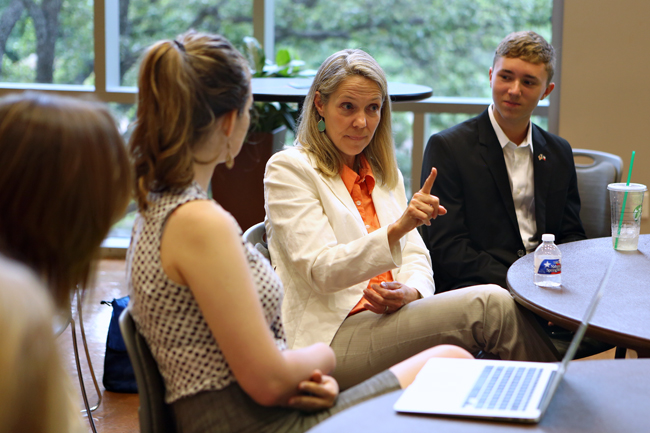The competitive nature of politics could contribute to women’s lack of political involvement and leadership roles, according to several community leaders who spoke in a panel on campus Saturday.
A group of female political leaders, including Martha Liner and Marijane Smitherman from Austin Republican Women and Mayor Pro Tem Sheryl Cole spoke at a panel about their experiences as women in politics, and gave advice to students about starting their own political careers.
According to the Women’s Campaign Forum, a nonpartisan, nonprofit established to encourage more women to run for office, 50 percent fewer women than men consider running for office.
Smitherman said the fear of failure might discourage some women from participating in politics.
“You have to be willing to lose, and I think that draws many women away,” said Smitherman, whose husband, Barry Smitherman, is a Texas Railroad Commissioner and former candidate for attorney general. “When you’re in a campaign, it’s competitive, and you’re taking that chance. The biggest thing is just to realize that you have to get back up and be resilient.”
Women are also less likely to be recruited into politics compared to men, according to Liner.
“They’re less likely to be approached by a party to campaign,” Liner said.
Cole, who agreed with Liner, said it is crucial for women to take initiative when it comes to political involvement.
“I was very active in school issues, and I took it upon myself to run,” Cole said. “You just have to get out there and do it.”
Plan II senior Andrea Onuigbo, who works on state Sen. Wendy Davis’ gubernatorial campaign, said she thinks the confidence gap between men and women in politics could also play a role.
“Women are afraid to go into the race, to enter into that goal of campaigning, unless they’re very confident that it’s going to be competitive and they’re going to do well,” Onuigbo said. “It’s that confidence gap — women don’t typically feel like they’re as supported if they go into campaigns, so they tend to wait and establish themselves a little bit more, versus a male who would be like, ‘I’m going to go straight for office,’ without as much experience.”
Liner said one motivation behind her entry into politics was the ability to enact change.
“I realized there was a lot of inefficiency and weird stuff going on in government … [and] I saw the opportunity to make changes,” Liner said. “At the state level, you have the opportunity to be more local, and so you see change happen much faster. That’s why I enjoy state government — you can see change, and it can happen very quickly.”
Liner said she encourages all women considering a career in politics to find a mentor.
“Especially for women in politics, it’s crucial to find a mentor and be a mentor,” Liner said. “It creates a support system and builds confidence.”



















